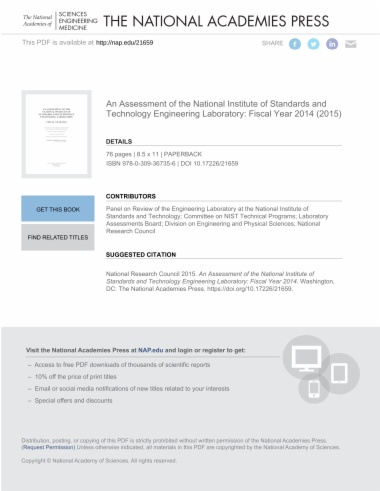

The mission of the Engineering Laboratory of the National Institute of Standards and Technology (NIST) is to promote U.S. innovation and industrial competitiveness through measurement science and standards for technology-intensive manufacturing, construction, and cyberphysical systems in ways that enhance economic prosperity and improve the quality of life. To support this mission, the Engineering Laboratory has developed thrusts in smart manufacturing, construction, and cyberphysical systems; in sustainable and energy-efficient manufacturing materials and infrastructure; and in disaster-resilient buildings, infrastructure, and communities. The technical work of the Engineering Laboratory is performed in five divisions: Intelligent Systems; Materials and Structural Systems; Energy and Environment; Systems Integration; and Fire Research; and two offices: Applied Economics Office and Smart Grid Program Office.
An Assessment of the National Institute of Standards and Technology Engineering Laboratory Fiscal Year 2014 assesses the scientific and technical work performed by the NIST Engineering Laboratory. This report evaluates the organization's technical programs, portfolio of scientific expertise within the organization, adequacy of the organization's facilities, equipment, and human resources, and the effectiveness by which the organization disseminates its program outputs.